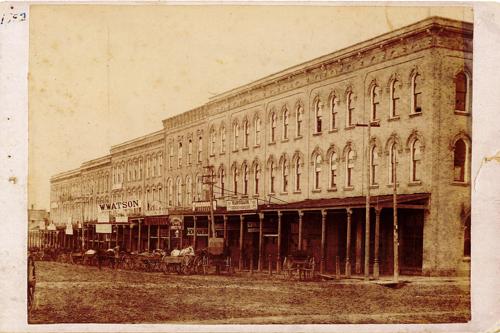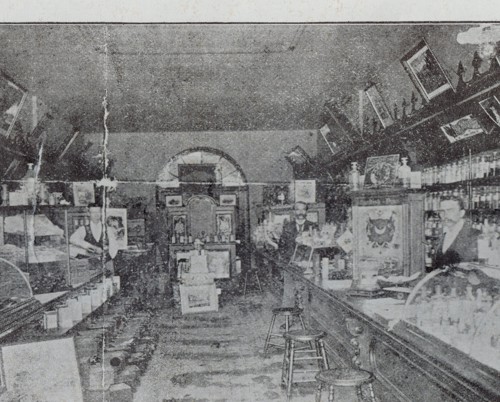Druggists
In the mid-nineteenth century, chemists and druggists would have prepared medicines for customers and sold ready made goods on their shelves. They may even have had a laboratory attached to the premises where they would have compounded their own mixtures, and processed botanicals and minerals to make drugs. These men may have had previous medical training as doctors, or had apprenticed with other men in the field prior to opening their business.
One of the first resident physicians, along with James Ault, Joseph Michael Tweedale operated as a druggist and grocer alongside Daniel Ward Eastman under the name Tweedale & Eastman. This partnership last only a few months in 1870 before it was dissolved, with Tweedale continuing to operate the business on his own. Through the business, Tweedale dispensed medicine to both humans and animals, with his “heave powders” for horses being considered quite effective. However, it appears this business was short lived, as by 1872 a newspaper advertisement in the Tillsonburg Observer dated April 11th, stated that a dividend sheet had been prepared in the matter of Joseph M. Tweedale, Insolvent.

Declaration of partnership between Tweedale and Eastman, 1870
Tweedale’s parents were early pioneers in Norfolk County, arriving from England. He began his medical career in Lobo Township in Middlesex County prior to arriving in Tillsonburg. He would eventually move his practice to Langton and later Port Burwell, in Norfolk County, where he passed away on June 24, 1910.
In June 1872, William A. McCollom and his brother, Carroll J. McCollom opened a drug store on Broadway under the name W.A. McCollom & Bro. The brothers had previously operated a store as chemists and druggists in Port Burwell and hoped to expand their business by opening another location in Tillsonburg. This partnership lasted until 1877 when it was decided William would carry on the business in Tillsonburg, while Carroll would continue the business in Port Burwell.
William A. McCollom managed to establish a successful drug store in Tillsonburg where he was known far and wide as a skillful pharmacist. By the late 1800s, his leading specialty was McCollom’s Rheumatic Repellant which was considered the most reliable and effectual remedy known at the time for improving symptoms of rheumatism. It secured a wide sale throughout Canada and the United States for its acknowledged curative qualities.
The same year the McCollom brothers opened their business in Tillsonburg, John Gayfer and Charles Thomson also opened a drug store in the town known as Gayfer & Thompson. It was operational until 1875, when Charles Thomson and Jehiel T. Moore, M.D. opened a drug store and apothecary on Broadway. Known as C. Thomson & Co., the partnership would eventually dissolve in October 1882, with Thomson continuing to operate the business on his own, along with a seed business which was also quite successful. Following his death, the business continued to operate.

The exterior of McCollom's drug store in Tillsonburg [courtesy of Annandale N.H.S. & Museum]

A view of the inside of McCollom's drug store in Tillsonburg.
Charles Thomson was born on the old Tripp farm, in West Oxford, and spent his childhood in and around Beachville, Ontario. Following his education, he entered employment with Messrs. Stark & Revell, druggists of Woodstock, where he learned his profession. Following his apprenticeship, he worked for some time in Strathroy before arriving in Tillsonburg. In 1872 he entered a partnership with Mr. Gayfer of Ingersoll. His son Charles was an apprentice to his father’s business and was also a lieutenant in the Oxford Rifles.
A successful entrepreneur, with business interests in Ridgetown and Guelph, Charles Thomson Sr. would pass away on March 23, 1899 at the age of fifty-two.

A declaration of partnership for Thomson & Co. of Tillsonburg, 1875.

Newspaper advertisement for Gayfer & Thomson, chemists & druggists, 25 April 1872.
